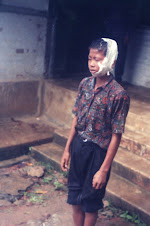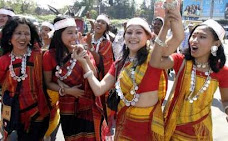Panpunji (Betel field) of Khasi indigenous people at Jaflong in Sylhet tried to occupy by mainstream people
[Report has been prepared with the help of news published on daily Prothom Alo on 10 July 2008]
On 18 June 2008 a group of land-hungry mainstream people tried to occupy 10 acres of land owned by Khasi indigenous people at Songram punji of east Jaflong in Sylhet. At night on that day, indigenous people opposed the Bengali Muslim people who had come to occupy the land. From that incident, they are guarding betel field by turns.
It is learnt that retired BDR (Bangladesh Rifles) person Habilder Muslem Uddin, a resident of Mohammadpur of Jaflong Ballaghat area tried to occupy 10 acres of land showing a letter of attorney in the name of his two sons. His two sons Shahin Alam and Mintu Alam with groups of people went there to grab betel field of Khasi people but they receded after they were chased.
Officer-in-Charge (OC) of Goainghat police station Md. Abdur Razzak said that indigenous people have been cultivating betel leaf on this land for generations. He also added that he asked the land-grabbers to show land document. But they failed to do. Later he learnt that the land is under indigenous people's record. It is mentionable that Khasi indigenous people traditionally cultivate betel leaf in this area for commercial purpose.
A team of Bangladesh Adivasi Odhikar Andolon (BAOA), an organisation working for upholding indigenous peoples' rights, rushed there to investigate the incident and returned to Dhaka few days ago after investigation. Team leader and General Secretary of BAOA Professor Mesbah Kamal said that the whole area of Jaflong situated at the bottom of Meghaloya, is a place of stones. A group of mainstream Bengali people are trying to occupy betel field to extract precious stones. He added that they would inform the concerned authority in Dhaka for taking necessary steps.
Ujjal Mehedi, a correspondent of Bengali national daily 'Prothom Alo' reported that 9 July he saw two young indigenous men on the spot who are repairing the fencing of betel field. A group of young people in tent are guarding one side of the garden and another group of people are protecting other side of garden. Delowar Lamin, an indigenous youth, informed that they are protecting garden by guarding in turns since after the incident of 18 June night. He also alleged that neither police nor local administration come forward for helping them.
Delowar Lamin said that the next day after the incident he on behalf of indigenous people filed a case against Muslim Uddin along with his two sons and two other people with Goainghat police station. But the police recorded it as general diary (GD) instead of case.
It is learnt that Khasi indigenous people are traditionally the owner of betel field. The present landlord Nerula Tongsong is paying revenue as an owner of the land. She paid revenue of Chailakhel mouza this year against the receipt no. 795496. She expressed that they are now in fear. On the other, Ujjal Mehedi reported that he went to Muslim Uddin's house on 9 July, but Shahin Alam was not found there. However, Muslim Uddin claimed that his son Shahin Alam bought these 10 acres of land by 7 lakh taka. In response to a question OC of Goainghat police station said that police took initiative to reconcile incident between two parties.
Modhupur eco-park wall would not be constructed
Says Raja Devaisish Roy at view-exchange meeting in Modhupur
On 11 July 2008 Special Assistant to the Chief Advisor Raja Devasish Roy attended a view exchange meeting with local indigenous people at Dokhala Rest House of Modhupur upazila in Tangail district. The view-exchange meeting was organised by Joyenshahi Adivasi Parishad with its president Ajoy Mree in the chair. Former member parliament and indigenous leader Promode Mankin and general secretary of Bangladesh Indigenous Peoples Forum Sanjeeb Drong were also present at the meeting where more than 500 indigenous people from 60 villages in Modhupur area participated. Indigenous people raised their problems regarding eco-park, national park, social forestry, forest cases filed against them, quota reservation in educational institutions and jobs etc.
Raja Debashish Roy assured the representatives of indigenous people that Modhupur eco-park wall would not be constructed. He said that postponing construction of eco-park wall, the fund for construction of wall was already transferred to other project. It is mentionable that indigenous people have been protesting against the construction of wall since 2001 as it hampers their livelihood.
Devasish also said that the government was thinking about preservation of indigenous people's quota in the local government polls and introduction of forest administrations that would include locals to protect the interest of forest dweller indigenous people.
He added that the present Forest Act would be amended, if required, to protect the interest of indigenous people. He added that earlier, forest-related cases had been filed indiscriminately against indigenous people including children, old people and even dead people. It cannot be allowed to continue. He urged the indigenous people to find out ways to preserve their rights.
Promode Mankin said that indigenous people have been living this area for centuries. Then King of Nathore allotted land for indigenous people. But successive governments since Pakistan regime created problems through its forest department by declaring eco-park, wood-logging, social forestry etc violating the rights of the indigenous people.
Sanjeeb Drong said that problems of indigenous people should be resolved in accordance with international conventions, such as, ILO 107 Convention on Indigenous and Tribal Peoples, Article 8j of Convention on Biological Diversity etc. Government should understand that forest and bio-diversity cannot be preserved without involvement of indigenous peoples. He also added that there were no Bengali people in Modhupur area during British regime, but only indigenous people of Garo and Koch. Till that time, forest and bio-diversity was intake. But it has gradually been demolished since after the settlement of Bengali people.
Raja Debashish Roy was welcomed by indigenous Garo people with their traditional songs and dances.
Update of Priya Tanchangya killing
It is learnt that rest of the 6 villagers arrested from no. 3 Rubber Bagan area were released. Following the killing of Priya Tanchangya on 27 June allegedly by a group of armed miscreants, 7 Jumma villagers from no. 3 Rubber Bagan area were arrested by joint forces. Among them, Joy Moni Tanchangya was sent to Bandarban jail and other 6 villagers were released later.
Sources also informed that a UPDF supporter named Ashok Kumar Tanchangya from Balaghata under Bandarban sadar upazila was arrested by joint forces on 7 July. But he was released later. It is also learnt that next day on 8 July an armed cadre of UPDF belong to Chakma (name is not available) who came there from Kaukhali upazila under Rangamati district was arrested with arm from Balaghata area in Bandarban by joint forces and as per his statement Ashok Kumar Tanchangya and Bindu Tanchangya were arrested later. A reliable source also confirmed that they were handed over to Rapid Action Battalion (RAB) and taken to Rangamati district.
Sources said that five PCJSS leaders, namely, Mr. K S Mong, assistant general secretary of central committee of PCJSS and also member of CHT Regional Council; Mr. Sadhuram Tripura, president of Bandarban district committee of PCJSS and also member of CHT Regional Council; Dr. Nilu Kumar Tanchangya, central member of PCJSS and also member of CHT Regional Council; Mr. Bimal Kanti Tanchangya, leader of Bandarban sadar upazila branch of PCJSS and Shambu Kumar Tanchangya, leader of Rowangchari upazila branch of PCJSS who were deliberately charged with the killing of Priya Tanchangya by deceased wife Ms. Chikan Bala Tanchangya got bail from High Court on 13 July 2008.
Resolve CHT issues thru' political means
Speakers tell discussion
The Daily Star, Dhaka, Sunday, July 13, 2008
The Chittagong Hill Tracts (CHT) issues should be resolved through political means, speakers at a discussion said yesterday. The Bangalees and hill people should put in joint efforts to solve the problems, they said. Some indigenous people at the meeting alleged that hundreds of acres of their lands are being acquired in the name of development activities.
The discussion titled 'Present situation of CHT and the responsibility of citizens' was held under the banner of 'Worried Citizens' at Mukti Bhaban auditorium in the city, with Prof Akmol Hossain in the chair.
Rashed Khan Menon, president of Workers Party of Bangladesh, said the problems in Chittagong Hill Tracts are absolutely political problems. Therefore, the issues should be resolved through political means, he added. He also said the CHT regional council is not functioning properly.
Prof Anu Muhammad of Jahangirnagar University called for giving constitutional recognition to the indigenous people. Comrade Khalequzzaman of Bangladesher Samajtantrik Dal said the local administration is acquiring hundreds of acres of land in CHT in the name of development. Advocate Gyan Jyoti Chakma said the situation in CHT has worsened after the caretaker government took over. He also accused the local administration of remaining indifferent to the suffering of indigenous people. Ruhin Hossain Prince of Communist Party of Bangladesh and Samir Kanti Dewan, a resident of CHT, also spoke.
The Kapaeeng Watch- E-mail: kapaeeng.watch@gmail.com, kapaeeng.watch@micico.ch
skip to main |
skip to sidebar

Military enforcement

Survive

Torture

Raped & Killed Indigenous Jumma Women

Militarization in CHTs

Religious destruction

Land Grabbing

Indigenous Jumma Villeges burnt down

Atrocities


CHTs is a number one of Millitary Zone in the World.

With Traditional Dress
nandawansa

Military enforcement

Survive

Torture

Raped & Killed Indigenous Jumma Women

Militarization in CHTs

Religious destruction

Land Grabbing

Indigenous Jumma Villeges burnt down

Atrocities
Embassy in Los Angeles
About Bangladesh
Refugee in Homeland

News Papers
Audio & Video
Actrocities & Tortures

CHTs is a number one of Millitary Zone in the World.
Jumma Photo Albums
Jumma Links
Jumma Women

With Traditional Dress
Blog Archive
About Me
- IJPNUSA
- The Indigenous Jumma People Net in North America is for the movement of minority Jumma indigenous people in Chittagong Hill Tracts in Bangladesh. E-mail:jpnus@yahoo.com Webpage:-http://jummapeoplenet.blogspot.com/
